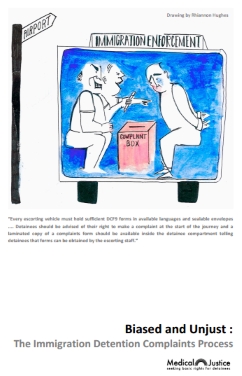New report says complaints procedure in UK immigration detention centres is unjust and calls for increased transparency and scrutiny
Medical Justice has released a new report looking at the complaints procedure in UK immigration detention centres.
The report, Biased and Unjust: The Immigration Detention Complaints Process, can be read here.
Medical Justice is a charity which sends independent volunteer doctors to immigration removal centres around the UK to challenge instances of medical mistreatment and help detainees get the healthcare they need.
In 2011, Medical Justice established a project to provide support and assistance to detainees making complaints against the Home Office and its contractors, and the report is based on Medical Justice's experience of these complaints.
 In a press release accompanying the report, Medial Justice says the Home Office has allowed an often unscrupulous complaints process to take root, free from independent systemic overview.
In a press release accompanying the report, Medial Justice says the Home Office has allowed an often unscrupulous complaints process to take root, free from independent systemic overview.
Complaints were handled by the Complaints Audit Committee until it was disbanded by the Home Office in 2008 after it found that 83% of complaint investigations were inadequate. According to Medical Justice, there has subsequently been no systematic overview of complaints to identify trends or to ensure lessons are learnt. Medial Justice says this is concerning, not least because the Home Office detains more people each year and fewer detainees have legal representation.
Medial Justice found that the alarmingly low levels of substantiated complaints raise serious concerns about the impartiality of the investigations, with one immigration removal centre's substantiation rate being just 2.5%, in contrast to the Prison & Health Service Ombudsman's rate of 80%.
Specifically, Medial Justice says all complaints of assault it has seen have been dismissed despite many having compelling medical evidence including photos and medical records. A complaint of sexual abuse was not upheld even though a staff member was dismissed and a compensation payment made to the victim, and many detainees, including key witnesses to events, are said to be removed before complaints have been investigated.
In the report, Medical Justice makes the following recommendations:
• Increase transparency and scrutiny of the handling of complaints.
• Provide an independent overview of the process replacing the role of the Complaint Audit Committee.
• Implement standards for investigation, access to evidence and police investigation.
• Ensure that healthcare complaints meet the standards of the NHS complaints procedures, including access to advocacy.
• Ensure that lessons are learnt from complaints, that action plans are produced and regularly followed up.
• Strengthen and clarify the role of independent monitoring boards in complaints.
• Improve access to the Parliamentary and Health Service Ombudsman to enable direct access, rather than through MPs.